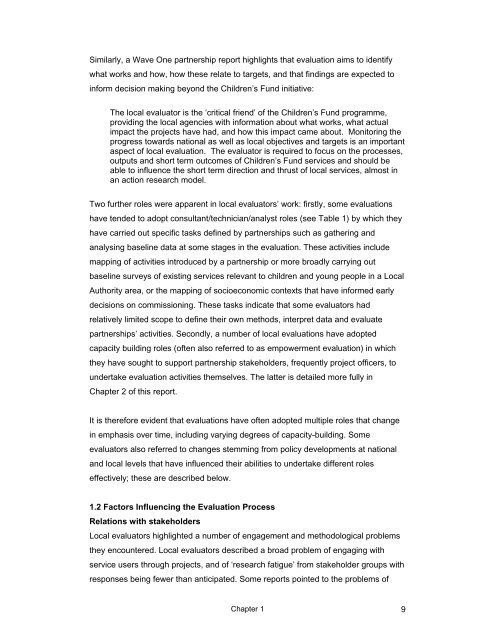Local Evaluation of Children's Services Learning from the Children's ...
Local Evaluation of Children's Services Learning from the Children's ...
Local Evaluation of Children's Services Learning from the Children's ...
- No tags were found...
You also want an ePaper? Increase the reach of your titles
YUMPU automatically turns print PDFs into web optimized ePapers that Google loves.
Similarly, a Wave One partnership report highlights that evaluation aims to identifywhat works and how, how <strong>the</strong>se relate to targets, and that findings are expected toinform decision making beyond <strong>the</strong> Children’s Fund initiative:The local evaluator is <strong>the</strong> ‘critical friend’ <strong>of</strong> <strong>the</strong> Children’s Fund programme,providing <strong>the</strong> local agencies with information about what works, what actualimpact <strong>the</strong> projects have had, and how this impact came about. Monitoring <strong>the</strong>progress towards national as well as local objectives and targets is an importantaspect <strong>of</strong> local evaluation. The evaluator is required to focus on <strong>the</strong> processes,outputs and short term outcomes <strong>of</strong> Children’s Fund services and should beable to influence <strong>the</strong> short term direction and thrust <strong>of</strong> local services, almost inan action research model.Two fur<strong>the</strong>r roles were apparent in local evaluators’ work: firstly, some evaluationshave tended to adopt consultant/technician/analyst roles (see Table 1) by which <strong>the</strong>yhave carried out specific tasks defined by partnerships such as ga<strong>the</strong>ring andanalysing baseline data at some stages in <strong>the</strong> evaluation. These activities includemapping <strong>of</strong> activities introduced by a partnership or more broadly carrying outbaseline surveys <strong>of</strong> existing services relevant to children and young people in a <strong>Local</strong>Authority area, or <strong>the</strong> mapping <strong>of</strong> socioeconomic contexts that have informed earlydecisions on commissioning. These tasks indicate that some evaluators hadrelatively limited scope to define <strong>the</strong>ir own methods, interpret data and evaluatepartnerships’ activities. Secondly, a number <strong>of</strong> local evaluations have adoptedcapacity building roles (<strong>of</strong>ten also referred to as empowerment evaluation) in which<strong>the</strong>y have sought to support partnership stakeholders, frequently project <strong>of</strong>ficers, toundertake evaluation activities <strong>the</strong>mselves. The latter is detailed more fully inChapter 2 <strong>of</strong> this report.It is <strong>the</strong>refore evident that evaluations have <strong>of</strong>ten adopted multiple roles that changein emphasis over time, including varying degrees <strong>of</strong> capacity-building. Someevaluators also referred to changes stemming <strong>from</strong> policy developments at nationaland local levels that have influenced <strong>the</strong>ir abilities to undertake different roleseffectively; <strong>the</strong>se are described below.1.2 Factors Influencing <strong>the</strong> <strong>Evaluation</strong> ProcessRelations with stakeholders<strong>Local</strong> evaluators highlighted a number <strong>of</strong> engagement and methodological problems<strong>the</strong>y encountered. <strong>Local</strong> evaluators described a broad problem <strong>of</strong> engaging withservice users through projects, and <strong>of</strong> ‘research fatigue’ <strong>from</strong> stakeholder groups withresponses being fewer than anticipated. Some reports pointed to <strong>the</strong> problems <strong>of</strong>Chapter 1 9
















